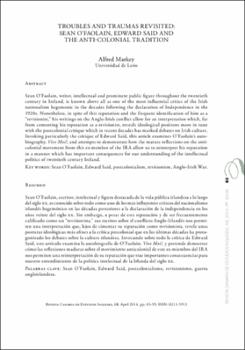Troubles and Traumas Revisited: Sean O'Faolain, Edward Said and the Anti-colonial Tradition
Autor
Markey, AlfredFecha
2014Resumen
Sean O'Faolain, escritor, intelectual y figura destacada de la vida pública irlandesa a lo largo del siglo xx, es conocido sobre todo como uno de los más influyentes críticos del nacionalismo irlandés hegemónico en las décadas posteriores a la declaración de la independencia en los años veinte del siglo xx. Sin embargo, a pesar de esta reputación y de ser frecuentemente calificado como un "revisionista", sus escritos sobre el conflicto Anglo-Irlandés nos permiten una interpretación que, lejos de cimentar su reputación como revisionista, revela unas posturas ideológicas más afines a la crítica poscolonial que en las últimas décadas ha protagonizado los debates sobre la cultura irlandesa. Invocando sobre todo la crítica de Edward Said, este artículo examina la autobiografía de O'Faolain, Vive Moi!, y pretende demostrar cómo las reflexiones maduras sobre el movimiento anticolonial de este ex-miembro del IRA nos permiten una reinterpretación de su reputación que trae importantes consecuencias para nuestro entendimiento de la política intelectual de la Irlanda del siglo XX. Sean O'Faolain, writer, intellectual and prominent public figure throughout the twentieth century in Ireland, is known above all as one of the most influential critics of the Irish nationalism hegemonic in the decades following the declaration of Independence in the 1920s. Nonetheless, in spite of this reputation and the frequent identification of him as a "revisionist," his writings on the Anglo-Irish conflict allow for an interpretation which, far from cementing his reputation as a revisionist, reveals ideological positions more in tune with the postcolonial critique which in recent decades has marked debates on Irish culture.
Invoking particularly the critique of Edward Said, this article examines O'Faolain's autobiography, Vive Moi!, and attempts to demonstrate how the mature reflections on the anticolonial movement from this ex-member of the IRA allow us to reinterpret his reputation in a manner which has important consequences for our understanding of the intellectual politics of twentieth century Ireland.





